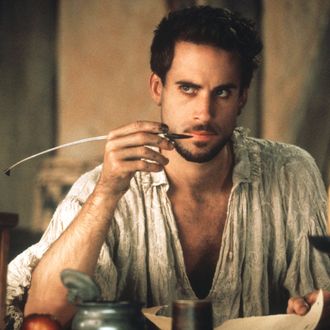
In the kind of surprise discovery that only seems possible as the beginning of a knockoff Da Vinci Code novel, a scholar at Cambridge named Jason Scott-Warren was browsing through some journal articles and stumbled across John Milton’s annotated copy of Shakespeare’s first folio. This is, not to put too fine a point on it, totally and thoroughly awesome.
Scott-Warren made the discovery while reading an article about the folio, which has belonged to the Philadelphia Free Library since 1944 and which was known to be heavily annotated by some anonymous former owner. The article, an examination of the annotations by Claire M.L. Bourne, included a few images from the text, which contained some handwriting Scott-Warren thought looked familiar. He proposed that the folio might have belonged to Milton in a personal blog post of all things, laying out the evidence and supplying several supporting images.
“It’s always annoying when someone tries to claim that they’ve discovered a lost literary artefact,” the post begins. “However, I’m going to make my own unwise pronouncement on the basis of just a few hours of research. I’m going to claim to have identified John Milton’s copy of the Shakespeare First Folio of 1623.” Since publishing the post on September 9, many Milton scholars have come forward with corroborating evidence, suggesting that this folio is the real deal.
Here’s why this is a giant deal: Sure, everyone knows about Shakespeare. But John Milton is the guy whom all the coolest kids of the Western canon were absolutely obsessed with. Paradise Lost is among the most influential works ever written in English, in part because it demonstrated the fruitful possibilities of reimagining the foundational Christian myth, but also because Milton’s Lucifer is a consummate wordsmith, and the epic poem becomes a tour-de-force demonstration of the power of language. (Writers, of course, have been eating that stuff up for centuries.) To better understand Milton’s thinking about Shakespeare is to better understand a crucial moment in the pantheon of English white-dude literature and its subsequent hegemony of global culture for hundreds of years.
It’s also unbelievably rare and special. There are only 235 known surviving copies of Shakespeare’s first folio, and to have found the one owned by John “I came up with the idea that innocence is not equal to goodness, and also I invented the modern divorce” Milton is remarkable. It’s even more remarkable because so much of what we have of Milton’s writing is not actually his own — Milton went blind in the middle of his life, and much of his work was dictated and transcribed by other poets and Milton’s own daughters. Finding a piece of actual Milton annotation after all these centuries is akin to finding a lost sketch by Vermeer, or a previously unknown Jane Austen short story.
And this guy just found it, and wrote about it on his blog! We live in strange and miraculous times. We can only hope HBO will write him a thank-you note for this unparalleled piece of unintentional promotion for its upcoming adaptation of His Dark Materials. (Guess where the phrase “his dark materials” comes from, I dare you.)


